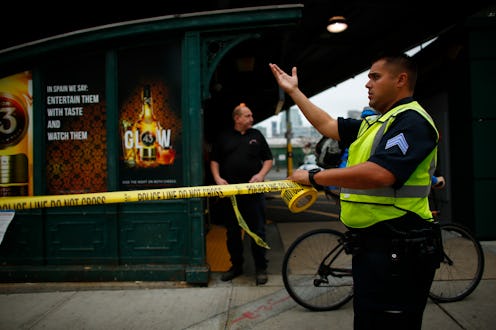News
The Hoboken Train Engineer Was Injured
Update: On Thursday evening, the Hoboken train engineer was identified as Thomas Gallagher, a New Jersey Transit employee who has been with the company for 29 years, 18 of them as an engineer. A National Transportation Safety Board spokeswoman said Gallagher has been released from the hospital and that investigators will be interviewing him.
Earlier: A New Jersey Transit commuter train crashed into the Hoboken station on Thursday morning, Sept. 29. The accident left at least one person dead and at least 100 others injured; it occurred during the rush hour commute at approximately 8:45 a.m. ET. The National Transportation Safety Board is investigating the accident, from the state of the train's tracks to the engineer's health and sleeping patterns as of late in order to determine what caused the accident. Government officials have cautioned against assuming terrorism. With the investigation underway, who is the Hoboken train engineer?
One freight engineer, William Blaine, who was present at the time of the accident and who witnessed the incident tells Bustle, "That train had to be going at least 30 miles an hour." There is very little information available on the Hoboken train engineer at this time. However, during a news conference on Thursday morning, New Jersey Gov. Chris Christie said the train's engineer was in critical condition. Christie added that the engineer was cooperating with investigators, according to the Associated Press. The engineer was initially unresponsive after the crash, and he was taken to a hospital and was in stable condition as of Thursday afternoon as reported by a New Jersey engineers union. The union also wrote, "Our thoughts and prayers go out to everyone involved in the incident in Hoboken this morning."
USA Today reports that both the train's engineer and conductor were taken to nearby hospitals, and indicated that investigators believe the engineer "failed to control the speed of the train entering the station, and that the lack of automatic braking at the site contributed to the crash." Blaine explained to CNN that the first car of the train was basically completely ruined and that the roof was crushed down on the train's seats.
One passenger named Leon Offengenden added, "The first car was just demolished. The train looked like it went through the stop. The first car looked like it catapulted onto the platform into the building. The roof collapsed. There was wire and water [and] everything," CNN reported. Offengenden later shared, "Now, looking back, I guess it didn't slow down. It definitely didn't slow down. There [were] no brakes. All of a sudden, it just crashed. Something happened obviously. ... It's the same feeling as when you get in a car crash."
The accident is currently under investigation, and the train's engineer is complying with investigators.
